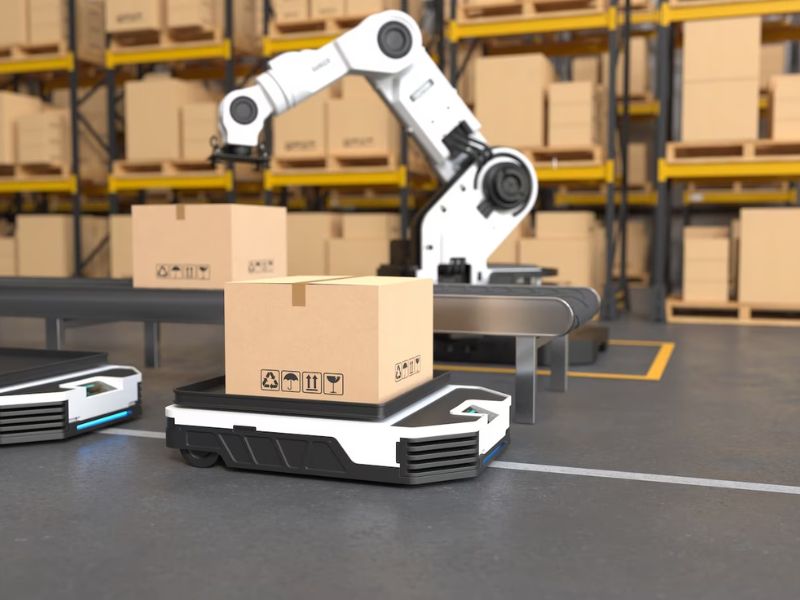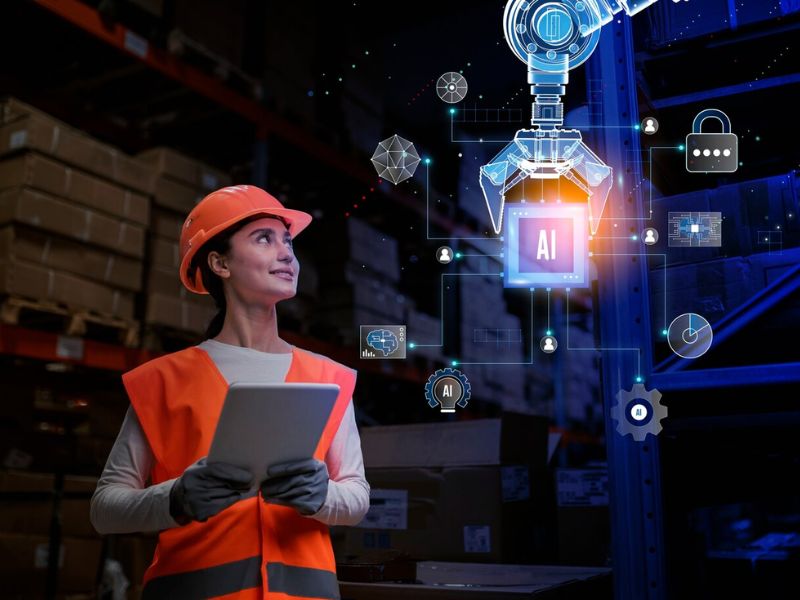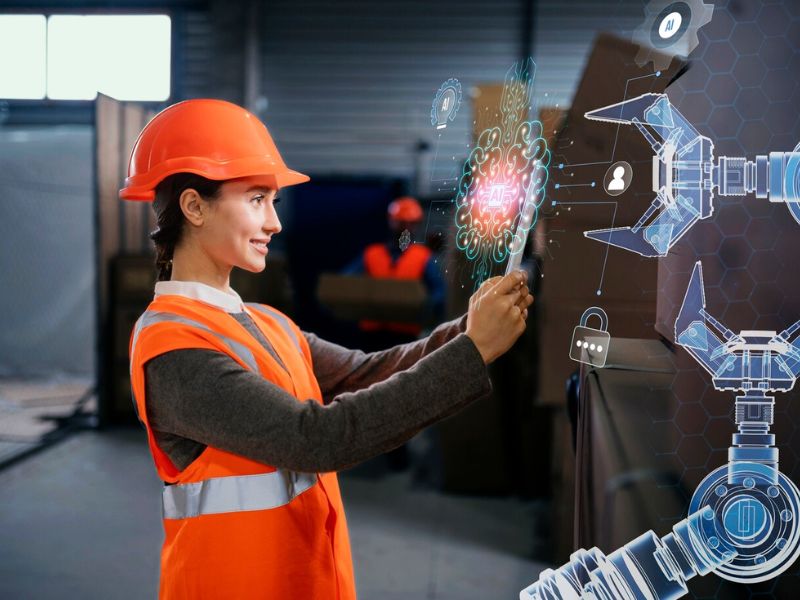AI may improve efficiency and robustness by using data-driven insights, automating repetitive tasks, optimizing decisions, and facilitating self-learning and adaptation. These advancements in AI have the potential to bring about personalized services, increased transparency and traceability, and reduced environmental impact. They offer new value propositions for consumers and stakeholders alike.
This article explores various aspects of supply chain management that can be enhanced by implementing artificial intelligence. We will discuss the most efficient methods of integrating artificial intelligence in supply chain and the potential challenges to watch out for. Read further to learn more from Nexle Corporation!
The Future of AI in Supply Chains and Logistics

AI in Supply Chains and Logistics
Artificial intelligence has the ability to transform the supply chain and logistics industries greatly. It can increase productivity and reduce costs. The way goods are distributed, handled, and transported may change significantly due to AI implementation. Automation, predictive analytics, and other AI technologies can benefit various supply chain processes. These advancements can bring about improvements in managing inventory, forecasting demand, tracing shipments in real-time, and optimizing transportation routes.
In addition, AI offers businesses numerous benefits, including cost savings by identifying wasteful practices and improved customer response times. When integrated into logistics and supply chain processes, AI can enhance productivity, reduce waste, and effectively meet the changing demands of the market.
Use Cases of Artificial Intelligence in Supply Chain
According to a survey from Gartner, a research and data insights business, fifty percent of supply chain firms would spend money on analytics and artificial intelligence programs between 2021 and 2024.
1. Warehouse automation
The employment of autonomous mobile robots (AMRs) is increasing in distribution centers worldwide. These robots can operate with minimal supervision from humans. Their capacity to complete intricate tasks is facilitated by integrating AI and advanced technologies like machine learning, computer vision, and sensor fusion.
AMRs have the ability to adapt to changes in warehouse layouts and requirements. This collaboration between AI robots and humans in the workplace creates a synergy that allows humans to focus on tasks that require their unique talents, like creativity and problem-solving, while the robots handle routine work.
Dynamic partnerships have the power to bring great advantages to the supply chain and logistics industries. They can boost efficiency, making operations more productive.

Use cases of AI in supply chain
2. Greener transport logistics
AI-powered solutions can optimize transportation routes by considering variables such as traffic, road closures, and weather. This optimization helps reduce the total distance traveled. An example of this is DHL, which uses AI to optimize truck routes and save fuel usage. By doing so, emissions are reduced, leading to enhanced sustainability.
Read more: Artificial Intelligence in the Workplace: Top 11 Tools to Do Your Tasks with Ease
3. Logistics automation
Artificial intelligence in supply chain has the potential to drastically improve supply chain and logistics customer service in a variety of ways. Among them is the capacity to monitor orders in real-time. Customers will appreciate the added transparency and peace of mind that comes from knowing exactly where their packages are at all times.
Moreover, NLP-based AI systems have the potential to automate customer care roles, thus alleviating the workload for human agents. For instance, AI can manage frequently asked questions (FAQs), freeing up human agents to focus on more complex tasks requiring their judgment and experience—such capabilities enable quicker responses to customer inquiries, leading to enhanced customer satisfaction.
4. Greener warehousing
Artificial intelligence-driven predictions can cut down on wasteful carbon emissions from warehousing and transporting surplus goods. Carbon emissions from warehouse energy use may be reduced with the use of smart energy utilization solutions. By leveraging AI and big data, the supply chain can be optimized in terms of efficiency and sustainability. This technological approach allows for a harmonious balance between effectiveness and environmental friendliness.
5. Inventory management
Inventory management software, when combined with AI, has the ability to enhance revenue by improving efficiency in analyzing stock levels across the entire supply chain. This may include determining the best practices for managing free- and foreign-trade zones, or it could involve optimizing inventory levels, or it could involve utilizing pricing and tracking data to relocate items to areas where they are more valuable.
6. Quality control
AI-enabled sensors and analytics tools have revolutionized quality control in supply chains and logistics companies. They can monitor product quality and identify faults in real-time. This ensures that items meet the highest standards before being delivered to consumers.
Some sensors are specifically created to detect inaccurate markings or missing components. Meanwhile, other sensors can identify cosmetic imperfections like scratches, fractures, and dents. RGB (10, 20, 41);”>Some AI algorithms used for predictive maintenance analyze product use and propose maintenance plans based on a variety of usage patterns.
Sensors powered by artificial intelligence may be used to track cargo health during shipping. Artificial intelligence in IoT sensors, for instance, may monitor environmental conditions like temperature and humidity to prevent spoilage of perishable commodities.
Businesses can guarantee only high-quality goods reach consumers by using AI-enabled sensors throughout the supply chain and logistical procedures. This helps keep customers happy and also keeps the integrity of companies’ names intact.
7. Product and process development
Incorporating cutting-edge generative AI, businesses can harness its potential to revolutionize product development. By analyzing a myriad of factors, including materials, sources, cost constraints, and sustainability aspects, generative AI not only suggest routes for production and distribution but also paves the way for substantial savings throughout the supply chain.

Artificial Intelligence in reality
8. Region-specific forecasts
Artificial intelligence in supply chain equips managers with valuable insights into regional demand. Take, for instance, the diverse festivals and fashion trends celebrated and followed across different regions. Leveraging artificial intelligence-driven forecasting systems can streamline fulfillment operations, customizing them to accommodate the unique requirements of each area based on specific regional factors.
Read more: Artificial Intelligence in Robotics: Top 6 Use Cases and Future (2024)
9. Bullwhip effect prevention
The bullwhip effect, which is a significant issue in the logistics industry, occurs when small changes at one end of the supply chain have a larger impact as they move both upstream and downstream. AI-powered forecasting systems, which collect data from buyers, sellers, producers, and retailers, can potentially help mitigate this effect. By controlling supply and demand fluctuations, these systems can reduce shortages and excessive inventory buildup.
Ikea, the global furniture company, has developed a demand forecasting tool that uses artificial intelligence. This tool combines historical and current data to accurately predict future customer demand.
10. Improved supplier communications
Robotic process automation (RPA) and AI-powered solutions can simplify supplier interactions. They help with tasks like submitting invoices and following up on payments. By automating these processes, unnecessary delays in shipping and manufacturing, such as those caused by late payments, can be eliminated.
Read more: Future of Artificial Intelligence: How Will It Change Industries?
Artificial intelligence in supply chain has the power to revolutionize the logistics industry. Supply chain managers can enhance their decision-making, efficiency, agility, and creativity by utilizing AI methods like machine learning, natural language processing, computer vision, and robotics. This benefits customers and stakeholders by improving service quality, transparency, and longevity and gives businesses a competitive advantage, creating sustainable value. AI holds significant promise for transforming the supply chain landscape.


